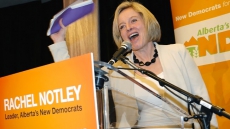OTTAWA — When Finance Minister Bill Morneau used a speech in Chicago on Wednesday to toss out an open invitation to Americans to visit Canada's natural splendour in 2017, he may have inadvertently highlighted a potential downside for one of the Liberal government's election promises.
Overcrowding at some popular national parks will need to be managed as Canada flings open the gates.
"In case you don't know, it's our 150th anniversary next year in Canada, 2017, and we're making all (national) parks free of entry fees next year," Morneau said as he wrapped up an appearance at the Federal Reserve Bank of Chicago. "So as you're thinking about your vacation plans for 2017, come to Canada!"
The Chicago audience laughed appreciatively, no doubt imagining the empty wilderness of their northern neighbour.
But Canadians who are already booking campsites know that the most accessible gems of the national park system fill up quickly to peak-season capacity.
Parks Canada opened reservations as of January this year, rather than April, and bookings are up 20 per cent so far over the same date in 2015, spokeswoman Natalie Fay said in an email.
"Some offers at certain locations are already heavily booked, particularly on long weekends and during the busy summer months, but others still have quite a lot of availability, particularly during the shoulder seasons," said Fay.
A weekday morning visit to Bruce Peninsula National Park on Georgian Bay last July illustrates the point: By 10 a.m., visitors hiking the half hour to the spectacular sea cave in the Niagara Escarpment found a rugged beach literally crawling with humanity.

"During the summer months, parking to access these sites fills to capacity regularly, resulting in visitors being denied access," cautions a Bruce Peninsula tourism web site.
It's the similar situation at the most popular parks across Canada.
This week, that uncomfortable truth was raised at a House of Commons committee, where Environment Minister Catherine McKenna was testifying about her new portfolio.
Liberal MP John Aldag, who spent 32 years managing operations at national historic sites and parks before running for office in 2015, cited a recent visit to Banff where traffic is already a concern.
"As we prepare for the free admission, what sort of thought is also going into maintaining ecological and cultural integrity of our parks and sites?" Aldag asked McKenna, while acknowledging the $83.3 million over five years in the Liberal budget to help Parks Canada accommodate the free admissions.
"I know on a summer's day in Lake Louise there's no parking already and I'm just wondering, with the money that's coming, if there will be any opportunities to mitigate, perhaps, increased visitation?"
"I'm not criticizing," Aldag hastened to add. "It's a wonderful thing for providing access."
McKenna acknowledged that discussions about park capacity are underway, although she downplayed the scope of the problem.
"I could not think of a better way to celebrate the beauty of Canada than through free access," said the Liberal minister.
While some national parks have large numbers of visitors, others see fewer than 100 people a year. However it seems unlikely that free admission will suddenly turn remote northern parks such as Auyuittuq National Park on Baffin Island into tourist meccas.
The question, McKenna told the committee, is "how do we maintain the ecological integrity of our parks — which is paramount — at the same time getting more people out to our parks to enjoy them?"
Parks Canada says it is increasing its inventory of campsites and promoting "lesser-known and less-visited" parks close to urban areas, such as Thousand Islands and La Mauricie National Parks. In anticipation of a 2017 visitor boost, said Fay, "we are encouraging shoulder-season visitation and promoting less-frequented and less-sensitive areas of our parks."
In an interview, Aldag called it a "best-case scenario" if Canadians embrace the free, Canada 150 access and rush to national parks.

"The vast majority of parks are under-utilized," he said.
"But when you do have crowding conditions, it impacts the entire visitor experience and it can have ecological or cultural integrity impacts."
First-time visitors to the most popular parks just need to be prepared for peak-season crowds, he said.
"In some ways it's managing visitor expectations."
The free access next year should give a huge boost to the profile of the national parks, which is good, as long as Parks Canada is prepared for the influx.
The key, said Aldag, is for park staff not to find themselves on July 1, 2017 saying "wow, we've had really good response to this program. Now what do we do?"



